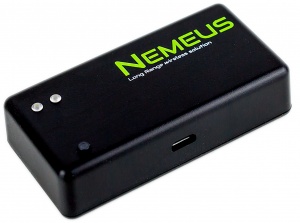Category:Smart IoT Sensor
The Smart IOT sensor is dedicated to prototyping IoT applications using wireless technologies such as SigFox™, LoRa™, Bluetooth™ Low Energy, GPS/GNSS.
In order to offer the fastest development time for application’s proof of concept, this product is 100% compatible with the Arduino IDE.
The board is made out of an host Atmel ARM Cortex M0+ MCU directly driving on-market, industry certified modules to enable connectivity. Sensors such as BMP280 (temperature/pressure) and ADXL-345 (accelerometer) are directly available on the board to meet user's application, as well as GPIO, including SPI and I2C to cover the widest range of peripherals.
This page includes documentation, examples and resources to use the Smart IoT Sensor.
Contents
1 Key features
- Arduino IDE Compatible
- LoRa™ / SigFox™/ FSK
- Bluetooth Smart (4.2)
- GPS / GLONASS / Galileo
- USB Interface
- Embedded battery charger
- All antennas included
- User programmable RGB LED
- Sensors:
- Accelerometer
- Temperature + Pressure
- Free GPIOs
- Dimensions: 50mm*50mm*25mm
2 General information and getting started
Smart IoT Sensor - Getting Started
3 Peripherals and Application Examples
3.1 Modules
LoRa/Sigfox module:MM002 en NEMEUS website Sigfox?
- Modulation : LoRa™ / SigFox™/ FSK
- Maximum output power +14 dBm
- Power efficient
- Good buildings penetration
- Long Range protocol stack software
Bluetooth Smart (Low Energy) chipset: nRF51822 on Nordic Semi website
- Bluetooth 4.1 Compliant (Bluetooth Smart)
- Software upgradable to Bluetooth 4.2
- TX power: up to +4 dBm
- RX sensitivity: down to -93 dBm
GPS/GNSS module: SIM33ELA on SIMCom website
- Accuracy: 2.5m standing
- Time-To-First-Fix:
- Cold starts: 28 s (typical)
- Warm starts: 26s
- Hot starts: <1s
- EPO Assist: 13s(CTTFF)
3.2 Sensors
Temperature/Pressure: BMP280 on Bosh website
Accelorometer: ADXL345 on Analog Devices website
3.3 GPIO
Several GPIO are available on the scratchpad:
- Arduino's analog pins A3, A4 and A5
- Arduino's digital pins 7, 8, 9 and 13
- Communication bus as SPI and I2C
3.4 Use cases
Pages in category "Smart IoT Sensor"
The following 2 pages are in this category, out of 2 total.
